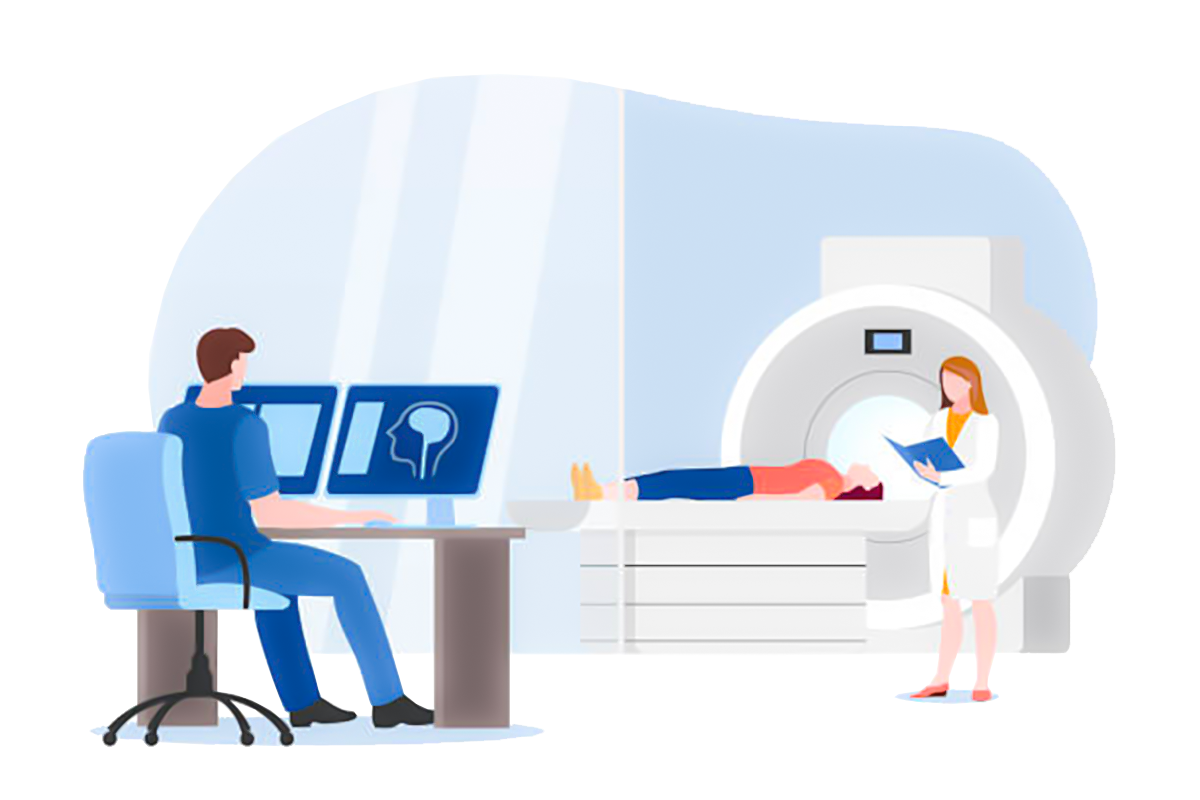This Course Structure is Curated as per the NEP-2020 Guidelines
Course Overview
M.Sc. Nuclear Medicine Technology program at Malla Reddy Vishwavidyapeeth, Hyderabad, is a postgraduate course designed to train students to assist healthcare teams in the safe and effective use of radioactive materials and imaging technologies for diagnosing and treating various medical conditions.
This program focuses on equipping students with the theoretical knowledge and hands-on skills from 1st semester itself. The curriculum focuses on advanced techniques in positron emission tomography (PET), single-photon emission computed tomography (SPECT), and radionuclide therapy. Students gain hands-on experience in handling radiopharmaceuticals, operating sophisticated imaging systems, and ensuring radiation safety for patients and healthcare teams during nuclear medicine procedures.
Graduates of this program emerge as ‘Skilled Nuclear Medicine Technologists’, enabling them to pursue further higher studies & do research in Nuclear Medicine Technology along with plenty of job opportunities globally.

Course Details
Description: 2 Years Degree Program
No. of Seats: 20
No. of Credits: 80 minimum & as specified
- Eligibility
- Curriculum Structure
- Program Outcomes
- Career Enhancement
- Higher Studies
- Job Roles & Progression
The minimum eligibility is a B.Sc. degree in Nuclear Medicine, Medical Imaging Technology, Radiology or equivalent with at least 50% aggregate marks from a recognized university.
The M.Sc. Nuclear Medicine Technology curriculum provides advanced training in nuclear imaging, radiopharmaceuticals, radiation safety, and diagnostic techniques. This program prepares students for roles in nuclear medicine departments, hospitals, diagnostic centers, and research facilities.
| Semester | Name of the Subject |
| Semester 1 | Advanced Anatomy and Physiology Principles of Nuclear Medicine Radiopharmaceutical Chemistry Radiation Physics and Safety Practical: Basic Nuclear Imaging |
| Semester 2 | Nuclear Imaging Techniques (PET, SPECT) Radiopharmacy and Radiochemistry Nuclear Medicine Instrumentation Pharmacology in Nuclear Medicine Practical: PET and SPECT Procedures |
| Semester 3 | Clinical Applications of Nuclear Medicine Dosimetry and Quality Control Research Methodology and Biostatistics Emerging Technologies in Nuclear Imaging Practical: Dosimetry and Quality Control |
| Semester 4 | Nuclear Medicine Unit Management Advanced Therapeutic Applications Thesis/Research Project Practical: Nuclear Medicine Unit Operations |
- Nuclear Imaging Techniques: Proficiency in nuclear imaging modalities such as PET, SPECT, and gamma cameras for disease diagnosis.
- Radiopharmaceutical Preparation and Handling: Skills in preparing, handling, and administering radiopharmaceuticals used in diagnostic imaging and treatment.
- Radiation Safety and Dosimetry: Knowledge of radiation safety protocols, exposure management, and radiation dose calculation.
- Quality Control in Nuclear Medicine: Expertise in monitoring equipment performance and ensuring compliance with safety standards.
- Clinical Applications of Nuclear Medicine: Understanding of nuclear medicine applications in oncology, cardiology, neurology, and other fields.
- Nuclear Medicine Unit Management: Skills in managing nuclear medicine operations, coordinating staff, and ensuring patient safety.
- Certification in PET and SPECT Imaging: Specialized training in advanced nuclear imaging techniques for various medical applications.
- Radiopharmacy Certification: Focus on the preparation, handling, and quality control of radiopharmaceuticals.
- Radiation Safety Officer (RSO) Certification: Emphasizes safety practices, regulatory compliance, and dosimetry in nuclear medicine.
- Nuclear Medicine Instrumentation Certification: Skills in operating and maintaining PET, SPECT, and gamma cameras.
- Clinical Applications in Oncology and Cardiology Certification: Covers nuclear imaging applications specific to oncology and cardiology.
- Ph.D. in Nuclear Medicine or Medical Imaging
- Fellowship in Nuclear Oncology or Cardiac Nuclear Imaging
- Postgraduate Diploma in Radiopharmacy
- Advanced Certifications in Pediatric or Neurological Nuclear Imaging
| Duration | Roles and Responsibilities | Salary Range |
| 0-3 years | Nuclear Medicine Technologist, Radiopharmacy Technician | ₹5,00,000 – ₹7,50,000 per annum |
| 3-5 years | Senior Nuclear Medicine Technologist, PET/SPECT Specialist | ₹7,50,000 – ₹10,00,000 per annum |
| 5-10 years | Nuclear Medicine Supervisor, Radiation Safety Officer | ₹10,00,000 – ₹15,00,000 per annum |
| 10+ years | Director of Nuclear Medicine Services, Chief Nuclear Medicine Technologist | ₹15,00,000+ per annum |
Note: Salaries vary based on experience, location, and type of healthcare institution.

Fee Structure Per Academic Year
| Tuition Fee | Miscellaneous Fee | Scholarship | ||
| 200000 ₹ | 10000 ₹ | Above 90% – 40000 ₹ | Between 80-90% – 20000 ₹ | Between 70-80% – 10000 ₹ |




